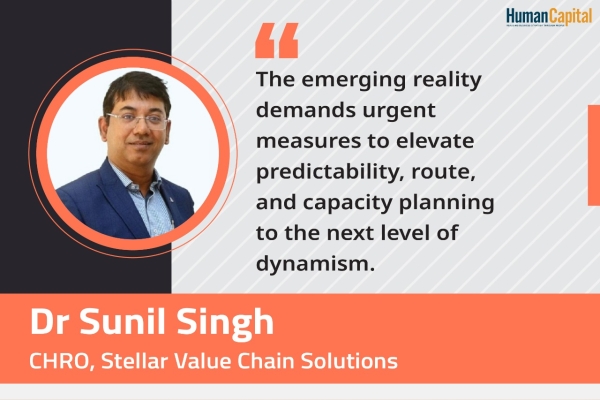Artificial Intelligence (AI), Robotics (including Chatbots), Machine Learning, Intelligent Screening Tools - have all moved out of the realm of mere concepts and possibilities into hard reality.
The very existence of the HR function and its deliverables - already under attack from outsourcing, automation, and self-service - and continuance, seem to be under threat. Was this an immediate development? Or was it there for long, while we failed to interpret the signs on the wall? What part of our function will get swamped by such developments? In what new avatar do we see the HR function re-emerge?
In the 1930s, John Maynard Keynes, a renowned economist, prophesied substitution of man by machines in his essay, “Economic Possibilities for Our Grandchildren.” John questioned the effects of automation on jobs, well-being, and happiness, seeking solutions to “technological unemployment.” Speaking about the increased utilization of robots in the workplace, Elon Musk stated, “When we react, it will be too late,” and added that this would represent “a fundamental risk to the existence of human civilization.” Apparently, the HR challenge is a mere subset of a larger “invasion.” Robotics have been in vogue in the manufacturing space for some time now and was welcome since it meant error-free manufacturing and consistent quality, and also eliminated humans from hazards, e.g., paint shops in the Auto industry or manufacture of dangerous chemicals. Progressively, robotic equipment and machines became smarter and more capable, and have today entered all areas of human endeavor. HR departments, which were always procedural and rule-bound, are subject to a major threat. Increasingly, what they did well is disappearing into machines and systems, operated by managers and employees in a self-service mode, relying less on the traditional monolithic and reactive HR departments with a large staff strength.
Transformational not abrupt
In all fairness, we must acknowledge that this development, although transformational, is not sudden or abrupt. Artificial Intelligence as a concept was proposed by Professor John McCarthy in 1956. While Intelligence is defined as “the capacity to learn and solve problems,” AI refers to the intelligence of machines and robots, and that branch of Computers that aims to create in the machines the ability to:
1. Solve problems
2. Act Rationally
3. Act like humans
While the earlier machines were used to handle monotonous tasks efficiently, and computers did large computations using fixed programming rules, AI is slowly fusing the human capacity to analyze, reason, and learn with the power of machines and robots. This raises the question of whether an intelligent machine workforce will totally replace humans, with unemployment looming in the near future. Taken to an extreme (e.g., Rajinikanth starrer Robot), is mankind endangered as AI robots take control of all commercial and industrial activity?
“While the earlier machines were used to handle monotonous tasks efficiently, and computers did large computations using fixed programming rules, AI is slowly fusing the human capability to analyze, reason, and learn with the power of machines and robots.”
Creating a win-win situation
Without going down the route of doomsday prophecies, if we study where AI has already made inroads in the “traditional” work of HR, we see many examples of AI being used in a win-win manner, viz.
1. Using automated and intelligent filters for recruitment
2. Online assessment and testing for candidates
3. Using robots for interviews
4. Making chatbots act as HR assistants to answer recurring questions from employees
5. Automated reminders and emails for engaging the new recruits, beginning well before s/he actually joins
6. Managing the process of Induction training or back-end administration of Performance Appraisals,
scheduling of feedback meetings, as well as all the analytics which helps create the base for comp reviews
7. Enforcing complete transparency for acquiring talented individuals
Robert Charlier, PriceWaterhouseCoopers has actually sounded a warning bell, “AI forces HR to rethink its added value and license to operate.” Service delivery of traditional HR departments was already impacted by computerized systems like PeopleSoft, Success Factors, etc. De facto HR had to move away from its traditional approaches of record management and administration, and move up the value chain to provide better decision support tools for line leaders. This is changing the landscape to such an extent that Jean-Paul Agon, Group Chairman, L’Oréal says, “Digital is not the cherry on the cake, it is the new cake.” In the new digital era, AI‑led employee experience is totally changing, and so are the roles and responsibilities of HR departments and staff.
Let us look at two examples of successful integration of AI systems by HR departments to improve their service delivery.
The L’Oréal Group has 80,000-plus employees globally and recruits around 15,000 candidates every year. As an industry stalwart, L’Oréal has no problem in finding talent – 5 million candidates visit their website annually seeking job opportunities, with an average of 134 applicants applying for one job. The costs and time to review all resumes and application letters were huge. With such huge application volume, the objective was to ensure efficient reviews in a timely manner, to not only recruit faster and meet business demands but also to provide a great candidate experience. This challenge was overcome by using an Application Tracking and Management system.
Secondly, Knockri, an online candidate screening tool, is used by those who require a strong front-line customer-facing talent. The Knockri AI system for HR uses audio and video analysis, assessing personality attributes to gauge how fit an applicant would be for a position based on employer feedback, industry knowledge, and scientifically backed data. The software system does not eliminate the person-to-person interview, it only acts as a highly intelligent ‘screening tool’, allowing employers to get the best applicant to the interview a lot quicker. Since 2016, this start-up is already disrupting the retail and hospitality industry by saving employers an immense amount of time and money in the screening and shortlisting process of hiring by using the power of AI.
AI and its advantages
Let us understand the multiple advantages companies are experiencing as they move forward and utilize AI approaches:
1. Personalization: Personalising the process of learning at the corporate level and recording critical employee data relating to a broad spectrum of behaviors and learning patterns.
2. Improved Recruitment: HR is a highly human-centric realm. Since human behavior is complicated, it is very hard to acquire basic analysis-focused data on individuals during the hiring process. This is where AI helps in predictive analytics using natural language processing, hastening the recruitment process by empowering businesses to weed out undesirable candidates – doing so with fewer errors.
3. Workflow Automation: AI is poised to be a game-changer when it comes to workflow problems. Automating processes like interview scheduling, employee performance reviews, employee on-boarding, and even the answering of basic HR questions - all fall under this category.
4. Better prediction models: Prediction models are vital in improving efficiency, productivity, and overall cost-effectiveness for any organization. This is where AI works its magic by analyzing turnover rates, internal employee engagement levels, and communications, or any other unforeseen problems that could take months or years to become visible.
5. Reducing Hiring Biases: The quality of data that a company’s AI is being trained on is really important. One of AI’s fundamental goals should be to help companies build a stronger and more diverse workforce. This means that the data being used to train the AI should be as unbiased as possible, so it can really help businesses increase their employment equity.
Thus, Engagement, Re-Engagement, On-Boarding, Follow-Ups, and Employee Training are all done better with AI. Smart HR managers will be front-ending this new approach, and work actively to integrate AI approaches in their service delivery models so that the employee, the organization, and the HR benefit from the power of AI.
Is your organisation post-COVID-ready?
Trending
-
SBI General Insurance Launches Digital Health Campaign
-
CredR Rolls Out 'Life Happens' Leave For Its Employees
-
Meesho Announces 30-Week Gender-Neutral Parental Leave Policy
-
Microsoft Unveils Tech Resilience Curriculum To Foster An Inclusive Future
-
60% Indian Professionals Looking For Job Change Due To COVID: Survey
-
SpringPeople And Siemens Collaborate For Digital Transformation Push
-
86% Professionals Believe Hybrid Work Is Essential For Work Life Balance: Report
-
Almost 1 In Every 3 People's Personal Life Affected Due To Work Stress
-
Meesho Rolls Out Reset And Recharge Policy For Employees
-
80% Of Talent Leaders & Academics Say Pandemic Changed Skill Needs For Youth: Report
-
Hero Electric Rolls Out 'Hero Care' Program For Employees
-
Human Capital In Collaboration With ASSOCHAM Hosts Virtual Conference
-
IKEA India, Tata STRIVE Collaborate To Create Employability And Entrepreneurship Opportunities
-
SAP India, Microsoft Launch Tech Skilling Program for Young Women
-
DXC Technology, NASSCOM Collaborate For Employability Skills Program
-
Lenskart To Hire Over 2000 Employees Across India By 2022
-
Mindtree Launches Learn-and-Earn Program
-
Tata AIA Extends 'Raksha Ka Teeka' To Its Employees
-
Swadesh Behera Is The New CPO Of Titan
-
NetConnect Global Plans To Recruit 5000 Tech Professionals In India
-
Hubhopper Plans To Hire 60% Of Indian Podcasters By 2022
-
Corporate India Needs More Women In Leadership Roles: Report
-
Aon to Invest $30 Million and Create 10,000 Apprenticeships by 2030
-
Tech Mahindra Launches ‘Gift a Career’ Initiative for Upskilling of Youth
-
40% Women Prefer Flexible Working Options in Post-COVID World: Survey
-
3 out of 4 companies believe they can effectively hire employees virtually: Report
-
Vodafone , CGI and NASSCOM Foundation launch digital skills platform
-
Odisha: Bank, postal employees to deliver cash for elderly, differently-abled persons
-
Skill India launches AI-based digital platform for "Skilled Workforce"
-
Hiring activity declines 6.73% in first quarter: Survey
-
70% startups impacted by COVID-19 pandemic
-
Bajaj Allianz Life ropes in Santanu Banerjee as CHRO
-
Over 70 Percent MSMEs look at cutting jobs to sustain businesses
-
93 Per Cent employees stressed about returning to office post-lockdown
-
Johnson & Johnson India announces family benefits for same gender partners
-
Indian firms turning friendly towards working mothers
-
Welspun India names Rajendra Mehta as new CHRO
-
Wipro partners with NASSCOM to launch Future Skills platform



Human Capital is niche media organisation for HR and Corporate. Our aim is to create an outstanding user experience for all our clients, readers, employers and employees through inspiring, industry-leading content pieces in the form of case studies, analysis, expert reports, authored articles and blogs. We cover topics such as talent acquisition, learning and development, diversity and inclusion, leadership, compensation, recruitment and many more.
Subscribe Now












































Comment